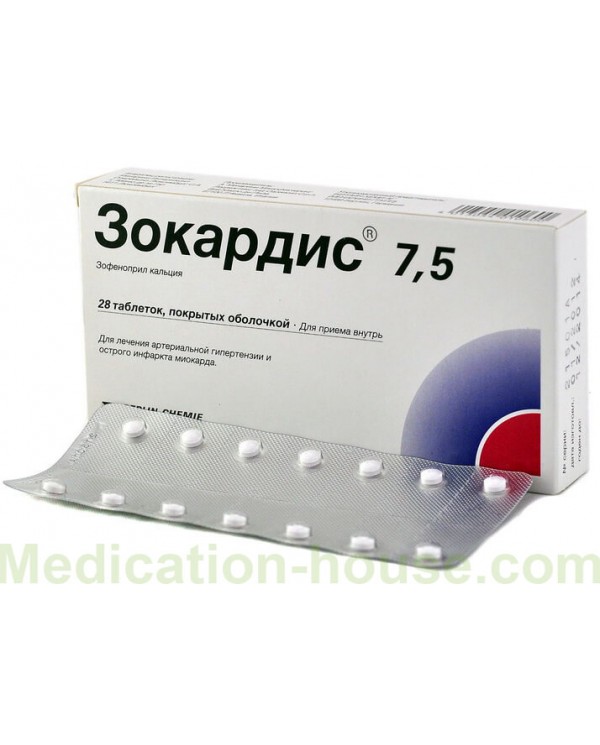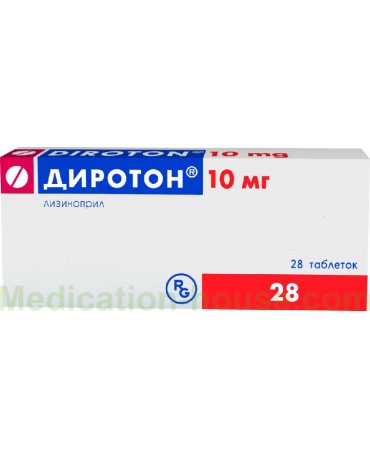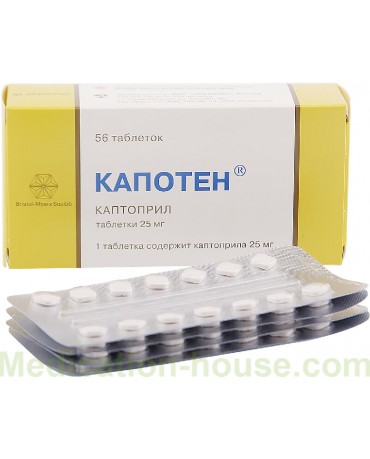Instruction for Zokardis
Reed more and buy Zokardis on this page
Zokardis is a drug with an antihypertensive effect.
Release form and composition
Dosage form of release - film-coated tablets: white; 7.5 mg each - round, biconvex; 30 mg each - oblong, with a double-sided dividing line (7 or 14 pcs. in blisters, in a cardboard box 1 or 2 packs).
Composition of 1 tablet:
active substance: zofenopril calcium - 7.5 or 30 mg (Zokardis 7.5 / Zokardis 30);
auxiliary components: anhydrous colloidal silicon dioxide - 1.5 / 6 mg; lactose monohydrate - 17.35 / 69.4 mg; microcrystalline cellulose - 19.3 / 77.2 mg; magnesium stearate - 1/4 mg; croscarmellose sodium - 3.35 / 13.4 mg;
shell: Opadray Y-1-7000 (hypromellose - 1.05 / 4.2 mg; titanium dioxide - 0.53 / 2.1 mg; macrogol 6000 - 0.32 / 1.28 mg; macrogol 400 - 0.11 / 0.42 mg).
Pharmacodynamics
Zokardis is an antihypertensive drug - an angiotensin-converting enzyme inhibitor. Its mechanism of action is associated with a decrease in the formation of angiotensin II from angiotensin I. A decrease in the content of angiotensin II leads to a direct decrease in the release of aldosterone, while reducing the total peripheral vascular resistance, systolic and diastolic pressure, pre- and afterload on the myocardium.
Increases the synthesis of prostaglandin, reduces the degradation of bradykinin. As a result of using the drug, the arteries expand to a greater extent than the veins, while a reflex increase in the heart rate is not observed.
Strengthens renal and coronary blood flow. The hypotensive effect is more pronounced at a high plasma concentration of blood renin than at its reduced / normal concentration. A decrease in blood pressure (blood pressure) in the therapeutic range does not affect cerebral circulation, blood flow in the vessels of the brain is maintained at a sufficient level and against the background of a reduced blood pressure.
With prolonged use, the hypertrophy of the left ventricle of the myocardium and myocytes of the walls of the arteries of the resistive type decreases, the progression of heart failure is prevented and the development of left ventricular dilatation slows down. Zokardis reduces platelet aggregation, improves blood supply to the ischemic myocardium.
Zofenopril is a prodrug, since the free sulfhydryl compound (zofenoprilat), which is formed as a result of thioether hydrolysis, is active.
The hypotensive effect after oral administration develops after 1 hour, it reaches a maximum after 4-6 hours and lasts up to 24 hours. In some cases, to achieve optimal blood pressure reduction, therapy is required for several weeks. A noticeable clinical effect in heart failure is observed with prolonged treatment (from 6 months).
Pharmacokinetics
After oral administration, zofenopril calcium is rapidly and completely absorbed from the gastrointestinal tract, with almost complete conversion to zofenoprilat.
Plasma Cmax of zofenoprilat in the blood is reached 1.5 hours after taking the drug. Plasma protein binding - 88%.
Zofenopril is rapidly metabolized in the liver (the active metabolite of zofenoprilat is formed). The half-life of zofenoprilat is 5.5 hours, the total clearance is 1300 ml / min. Zofenoprilat is excreted mainly by the kidneys - 69%, through the intestines - 26%.
Indications for use
arterial hypertension, proceeding in I – II (mild and moderate) severity;
acute infarction in patients with stable hemodynamic parameters and not undergoing thrombolytic therapy, including with symptoms of myocardial heart failure (starting from the first 24 hours).
Contraindications
Absolute:
idiopathic / hereditary angioedema;
burdened history of angioedema associated with the use of angiotensin-converting enzyme inhibitors;
severe hepatic impairment (on the Child-Pugh scale more than 9 points);
condition after kidney transplantation (due to lack of experience in use);
bilateral stenosis of the renal arteries or stenosis of the renal artery of a solitary kidney (associated with the risk of developing renal failure);
primary aldosteronism;
hereditary lactose intolerance, lactase deficiency or lactose-glucose malabsorption syndrome;
combined use with aliskiren and preparations containing aliskiren in patients with diabetes mellitus or impaired renal function (at a glomerular filtration rate <60 ml / min / 1.73 m2);
simultaneous dialysis using low density lipoprotein plasmapheresis (LDL apheresis) or high-throughput polyacrylonitrile membranes;
use in women of childbearing age who are not using effective contraception;
age up to 18 years;
pregnancy and lactation;
individual intolerance to the components of the drug, as well as other inhibitors of the angiotensin-converting enzyme.
Relative (diseases / conditions in the presence of which the administration of the drug requires caution):
unilateral renal artery stenosis, renovascular hypertension;
burdened history of angioedema, not associated with the intake of angiotensin-converting enzyme inhibitors;
hypertrophic obstructive cardiomyopathy, mitral stenosis, aortic stenosis, impaired blood outflow from the left ventricle;
chronic renal failure;
liver failure of mild and moderate severity (on the Child - Pugh scale less than 9 points);
cerebrovascular diseases;
chronic heart failure (NYHA classification - III – IV functional class);
psoriasis;
diabetes;
hyperkalemia;
systemic connective tissue diseases (including systemic lupus erythematosus, scleroderma);
conditions under general anesthesia / surgery;
simultaneous desensitizing therapy;
conditions that are accompanied by a decrease in the volume of circulating blood (as a result of the use of diuretics, during hemodialysis, restriction of sodium chloride intake, vomiting and diarrhea);
belonging to the Negroid race;
age over 75 years.
Instructions for use of Zokardis: method and dosage
Zokardis is taken orally without chewing, drinking plenty of liquid. The tablets can be taken with or without food.
To choose the optimal dosage regimen, it is advisable to use the most appropriate dosage form of the drug release - with a content of 7.5 or 30 mg of the active substance.
Arterial hypertension
According to the instructions, Zokardis can be taken as monotherapy and in combination with other antihypertensive drugs.
In the absence of impaired renal function, to achieve optimal blood pressure, treatment begins with 15 mg 1 time per day. In case of insufficient severity of the hypotensive effect, the dose can be gradually increased (with an interval of 4 weeks).
The average dose is 30 mg in 1 dose, the maximum - 60 mg in 1–2 doses.
If there are violations of the water and electrolyte balance, before the appointment of Zokardis, it is necessary to correct it and discontinue the diuretics used 2-3 days before starting therapy. The starting dose in this case is 15 mg per day. If it is impossible to carry out the measures described above, the drug is prescribed at 7.5 mg per day.
Patients with impaired renal function, including the elderly, with creatinine clearance <45 ml / min, are usually prescribed 1/2 of the average therapeutic dose in 1 reception, for patients on dialysis - 1/4 of the dose.
The initial dose for mild / moderate hepatic impairment is 1/2 dose. Zokardis is not prescribed for patients with severe disorders.
Acute myocardial infarction
The drug should be started within 24 hours after the first symptoms of myocardial infarction appear. The therapy is continued for 6 weeks according to the following scheme (single dose, frequency of administration - 2 times a day, observing equal breaks): the first 2 days - 7.5 mg, the next 2 days - 15 mg, starting from the fifth day of treatment - 30 mg ...
In cases of an excessive decrease in blood pressure at the beginning of treatment or during the first 3 days after myocardial infarction, the initial dose should not be increased (complete withdrawal of the drug may be required).
In patients without signs of heart or left ventricular failure, Zokardis can be canceled after 6 weeks. In order to correct left ventricular / heart failure, as well as arterial hypertension, therapy can be continued for a long time.
Patients over 75 years of age should be prescribed the drug with caution.
Side effects
nervous system: confusion, dizziness, anxiety, headache, insomnia, weakness, depression, increased fatigue, drowsiness; very rarely (in cases of taking high doses) - paresthesia, nervousness;
urinary system: proteinuria, increased urea / creatinine levels, impaired renal function;
cardiovascular system: orthostatic collapse, excessive lowering of blood pressure; rarely - angina pectoris, chest pain, myocardial infarction (usually associated with a pronounced decrease in blood pressure), arrhythmias (atrial fibrillation, atrial tachy- or bradycardia), thromboembolism of the branches of the pulmonary artery, palpitations, fainting, pain in the heart;
hematopoietic system: in some cases - neutropenia, thrombocytopenia, agranulocytosis (against the background of autoimmune diseases), eosinophilia;
respiratory system: unproductive dry cough; very rarely - rhinorrhea, bronchospasm, pharyngitis, shortness of breath, interstitial pneumonitis;
digestive system: anorexia, dry mouth, intestinal obstruction, dyspeptic disorders (in the form of nausea, diarrhea or constipation, vomiting, abdominal pain), hyperbilirubinemia, increased activity of hepatic transaminases, pancreatitis, biliary tract / liver function disorders, jaundice, hepatitis ;
allergic reactions: rarely - skin rash, angioedema (tongue, lips, face, extremities, larynx and / or glottis), polymorphic erythema, dysphonia, exfoliative dermatitis; very rarely - Stevens-Johnson syndrome, toxic epidermal necrolysis, pemphigus, serositis, pruritus, photosensitivity, myositis, arthralgia, stomatitis, arthritis, urticaria, vasculitis, glossitis;
sense organs: rarely - tinnitus, disorders of the vestibular apparatus, visual / auditory disorders;
laboratory parameters: hyperkalemia, hyperbilirubinemia, increased urea levels, hypercreatinemia, increased activity of aspartate aminotransferase, alanine aminotransferase, hyponatremia; in some cases - neutropenia, lowering hematocrit and hemoglobin, thrombocytopenia, increased ESR, eosinophilia, agranulocytosis (against the background of autoimmune diseases).
Overdose
The main symptoms: convulsions, a marked decrease in blood pressure (collapse, myocardial infarction, acute cerebrovascular accident or thromboembolic complications may develop), stupor.
Therapy: the patient must be transferred to a horizontal position with a low headboard; ingestion of saline and gastric lavage (in mild cases) or measures aimed at stabilizing blood pressure (in more severe cases) is carried out.
Special instructions
When using high-flow dialysis membranes, the likelihood of anaphylactic reactions increases. On dialysis-free days, the dosage regimen should be adjusted based on blood pressure. Before and after therapy with Zokardis, it is necessary to control the blood pressure level, blood parameters (potassium, hemoglobin, urea, creatinine, aspartate aminotransferase, alanine aminotransferase), and the level of protein in the urine.
A transient marked lowering of blood pressure is not a contraindication for continuing therapy with the drug after stabilization of blood pressure. In cases where these conditions recur, it is necessary to reduce the dose, or to cancel the intake of Zokardis.
With the development of an excessive decrease in blood pressure, the patient must be transferred to a horizontal position with a low headboard, depending on the condition, plasma substitutes and 0.9% sodium chloride solution can be introduced.
The condition of patients with severe heart failure, coronary heart disease and cerebrovascular disease, in which a sharp decrease in blood pressure can lead to stroke, myocardial infarction or impaired renal function, should be carefully monitored. A sudden cancellation of Zokardis does not lead to a withdrawal syndrome (a sharp rise in blood pressure).
With a burdened history of angioedema while taking angiotensin-converting enzyme inhibitors, there is an increased risk of its occurrence.
With reduced renal function, a decrease in a single dose or an increase in the interval between doses of the drug is shown.
Because of the likelihood of dehydration and an excessive decrease in blood pressure associated with a decrease in circulating blood volume, if necessary, exercise in hot weather, patients should be careful.
Before starting surgical interventions (including dental ones), the surgeon / anesthesiologist should be warned about taking Zokardis.
The condition of newborns / infants who have been exposed to intrauterine exposure to the drug is recommended to be closely monitored (in order to timely detect such disorders as a pronounced decrease in blood pressure, oliguria, hyperkalemia and neurological disorders, possible due to a decrease in cerebral / renal blood flow with a decrease in blood pressure, associated with the reception of Zokardis). In cases of the appearance of oliguria, maintenance of blood pressure and renal perfusion is required by the introduction of vasoconstrictors and appropriate fluids.
Drinking alcoholic beverages during treatment is not recommended, since alcohol intake leads to an increase in its hypotensive effect.
With simultaneous use with hypoglycemic agents, the likelihood of hypoglycemia increases.
Influence on the ability to drive vehicles and complex mechanisms
During the selection of a therapeutic dose, patients are advised to refrain from driving vehicles, which is associated with the likelihood of dizziness (especially after taking the initial dose of Zokardis in patients taking diuretics).
Application during pregnancy and lactation
Taking Zokardis during pregnancy and lactation is contraindicated.
Women of childbearing age should use reliable contraceptive methods during therapy.
Childhood use
The use of Zokardis in children under 18 years of age is contraindicated.
With impaired renal function
Patients with creatinine clearance <45 ml / min, as well as patients on dialysis, undergo a daily dose adjustment.
For violations of liver function
mild / moderate: lower doses are prescribed;
severe: the drug is contraindicated.
Use in the elderly
In patients over 75 years of age with myocardial infarction, Zokardis should be prescribed with caution.
Drug interactions
non-steroidal anti-inflammatory drugs: reducing the hypotensive effect of zofenopril;
other antihypertensive drugs, agents for general anesthesia, diuretics, ethanol, analgesics-antipyretics: increased action of Zokardis;
lithium salts: slowing down the elimination of lithium;
potassium-sparing diuretics: the occurrence of hyperkalemia;
hypoglycemic agents: increasing the likelihood of hypoglycemia;
allopurinol, immunosuppressants, cytostatics: increased hematotoxicity of zofenopril.
Terms and conditions of storage
Store at temperatures up to 25 or 30 ° C (7.5 / 30 mg tablets). Keep out of the reach of children.
The shelf life is 3 years.
Reviews about Zokardis
Reviews of Zokardis as a whole indicate its effectiveness. In some cases, patients develop adverse reactions or lack of therapeutic action, which requires medical advice.
Terms of sell
You can buy Zokardis without a prescription.



